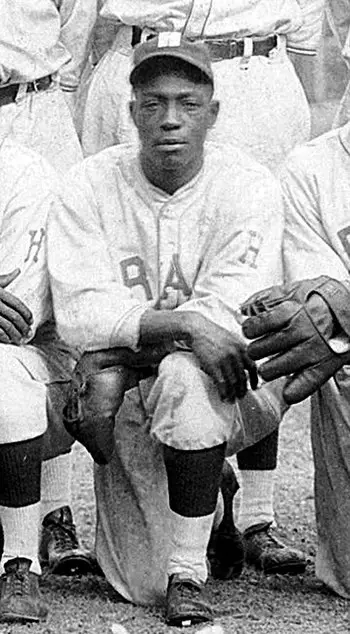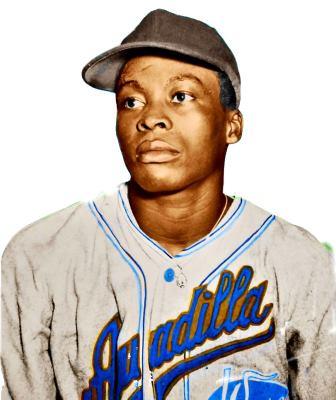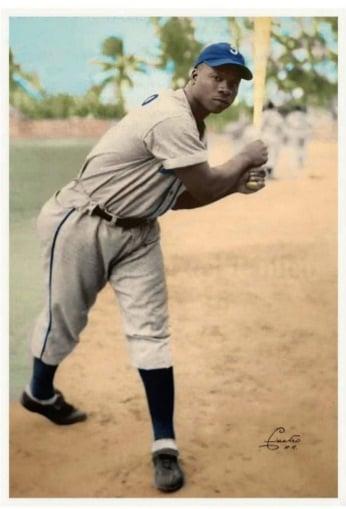Nineteen Major League managers who once played or managed in the Puerto Rico Winter League (PRWL) or barnstormed in Puerto Rico led their big league teams to a combined 27 World Series crowns, from José Méndez, who led the 1924 Kansas City Monarchs to the first Negro World Series (aka 1924 Colored World Series) title, to Bruce Bochy, who managed the San Francisco Giants to 2010, 2012, and 2014 titles, plus the 2023 Texas Rangers to their first World Series title. Part I focused on José de la Caridad Méndez, aka José Colmenar del Valle Méndez, «El Diamante Negro” (The Black Diamond), plus Frank Duncan and Quincy Trouppe. Part II covers Vic Harris. All are Major League managers and players due to the December 16, 2020 ruling by MLB Commissioner Rob Manfred giving Major League status to seven Negro Leagues between 1920-1948. Vic Harris was the winning manager in the final Negro League World Series in 1948 between the Homestead Grays and Birmingham Black Barons.

Vic Harris
Harris (June 10, 1905-February 23, 1978) was born in Pensacola, Florida, near where the author writes this blog in his R.V. The Harris family moved to Pittsburgh when Vic was nine or 10, per Charlie Fouche, his SABR biographer. https://sabr.org/bioproj/person/vic-harris-2/ Vic Harris graduated from high school in Pittsburgh before embarking on a 25-year playing career in the Negro Leagues, mainly with the legendary Washington Homestead Grays. He barnstormed in Puerto Rico and Cuba and played one sanctioned (1939-40) winter season. He played for the barnstorming 1936 Brooklyn Eagles against the Cincinnati Reds (the first big-league team to do their spring training in San Juan, Puerto Rico) at Escambrón Stadium. The Eagles’ «All-Star Team» comprised Raymond Brown, Ray Dandridge, Leon Day, Vic Harris, Buck Leonard, and Dick Seay, among others. Azteca from Mexico and Almendares from Cuba were other opponents of the Eagles and Reds. Harris and his Brooklyn Eagles teammates were treated with fine hospitality, courtesy, and respect in Puerto Rico, staying at friendly hotels and dining at the best San Juan restaurants.
From October 8-16, 1938, Harris and 12 other Homestead Grays teammates played six games in Havana versus Almendares, Havana and a Cuban All-Star Team. The Grays won two contests despite featuring catcher Joshua Gibson, first baseman Buck Leonard, shortstop Willie Wells, and an outfield with Harris and Sam Bankhead. Their four pitchers were Raymond and Barney Brown, Roy Partlow, and Terris «The Great» McDuffie. Homestead swept all six games with these same opponents a year later (October 7-15, 1939). Partlow was the only returning pitcher for the Grays. Felton Snow replaced Harry Williams at third. Homestead’s Harry Cozart defeated Havana’s Luis Tiant Sr. in the opener, while Bud Barbee triumphed over Martín Dihigo (Cuban All-Stars) in Game Six, 5-0. Harris remained in Cuba to reinforce the 1939-40 Santa Clara Leopards (24-27), who tied Havana for third place behind Almendares (28-23) and Cienfuegos (26-25). Harris hit .259 with a homer and seven RBIs. His teammate Roy Partlow (7-4) left Santa Clara mid-season to pitch for the San Juan Senators. Partlow—7-0 with San Juan—defeated Guayama’s Satchel Paige (19-3 W-L) at Sixto Escobar Stadium, formerly Escambrón Stadium. It was, and is, a common practice for some players to switch winter leagues during a season. Most of Santa Clara’s imports and native players, including Santos Amaro, Sam Bankhead, Tony Castaño, and Chester Williams, remained with the team.
Vic Harris as Manager in a Record Eight East-West All-Star Games
- Harris posted a 4-4 managing record, per his SABR bio, managing the East All-Star Team in eight East-West All-Games in six years: 1941-43, 1945-46, and 1948. Selected highlights include:
- Dave Barnhill (New York Cubans) won the July 27, 1941, All-Star Game, 8-3, for the East. Buck Leonard (Washington Homestead Grays) homered in front of 50,246 fans.
- Leon Day (Newark Eagles) outpitched Satchel Paige (Kansas City Monarchs) in a 5-2 East win on August 16, 1942 (Game One). Attendance was 45,179.
- On August 1, 1943, Satchel Paige (Memphis Red Sox) bested Barnhill (New York Cubans), 2-1. Buck Leonard homered for the East Team at Comiskey Park. Attendance: 51,723.
- In Washington, DC, at Griffith Stadium, Bill Byrd (Baltimore Elite Giants) won, 6-3, against Webbo Clarke (Cleveland Buckeyes). Attendance was 16,269 on August 15, 1946.
- Two All-Star Games occurred in 1948—at Comiskey Park (August 22) and Yankee Stadium (August 24). Bill Powell (Birmingham Black Barons) won the former, 3-0; Max Manning (Newark Eagles), the latter. A moment of silence took place in Yankee Stadium before that contest in memory of Babe Ruth’s passing at age 53.
Storied Career with Washington Homestead Grays
Most of Harris’s pro career was spent as a player, player-manager, and manager with the Grays. His teams (as a manager) won eight Negro Leagues titles, more than double the three won by other skippers, including José Méndez. Harris posted a .305/.372/.436 slash line and .808 OPS in 21 seasons as a Grays player. He was a model of consistency with a .306/.374/.433 slash line, and .808 OPS in 25 total Negro Leagues campaigns. Teams he played for included the Pittsburgh Crawfords, Pittsburgh Keystones, Cleveland Tate Stars, Chicago American Giants, Cleveland Browns, and Detroit Wolves. The focus of Harris’s managing will be on the 1948 Homestead Grays, winners of the 1948 Negro League World Series.
The 1948 Homestead Grays and their Connection to the PRWL
Harris led Homestead to a 42-24-1 record in the Negro National League II and a 54-25-3 overall mark. First baseman Buck Leonard had starred for the 1940-41 Mayagüez Indians, PRWL, with a .390 B.A. and .737 SLG. His eight homers tied Roy Campanella for the league lead, and 17 doubles led the loop. Wilmer Fields played splendidly with San Juan and Mayagúez between 1947 and 1951, most notably with the 1948-49 Indians—who were 51-29 and represented the PRWL in the first [1949] Caribbean Series. Fields helped the Grays win the 1948 World Series and was a valued reinforcement for Mayagüez at third base and on the mound. His 108 hits in 325 AB were good for a .332 B.A. He cracked 11 homers, drove 88 runs (a franchise record), and posted a .498 SLG. Shortstop Sam Bankhead was one of Caguas’s catalysts for winning the 1947-48 PRWL crown. The Grays OF—Luke Easter, Luis «Canena» Márquez, and Bob Thurman—were well known to PRWL aficionados. Easter led the 1948-49 PRWL with a .402 B.A.; was second in RBIs with 80, behind Fields’s 88; and clubbed 14 homers, third to co-winners Willard Brown and Bob Thurman’s 18 round-trippers. Easter’s 81 runs topped teammates Alonzo «His Majesty» Perry (76), Artie Wilson (69), and Carlos Bernier (64). Canena, with the Aguadilla Sharks, scored 65 runs. Easter’s 27 doubles and nine triples led the league. His .751 SLG was astronomical. Per historian Jorge Colón Delgado, Easter is the only player in PRWL history to score 80+ runs and drive in 80+ runs in the same season!

Luis ¨Canena¨ Márquez
Canena Márquez had a storied 20-year PRWL career punctuated by edging San Juan’s Larry Doby for the PRWL HR title (14 to 13) in 1946-47 and topping Caguas’s Hank Aaron for the loop’s 1953-54 batting title: .333 for Canena and .322 for Aaron, with Ponce’s Charles Harmon coming in second at .325. Márquez (and Carlos Bernier) also starred in the Pacific Coast League. Bob Thurman, who became the author’s friend in October 1991, holds the PRWL career record with 120 homers and 566 RBIs in 12 winter seasons, 11 with Santurce (1947-48 to 1957-58) plus 1959-60 with Ponce. «Vic Harris was my Santurce manager my first three winter seasons [1947-50],» recalled Thurman. «We—myself, Willard Brown, Harris, Earl Taborn, John Ford Smith… lived in a big house in the Miramar section of Santurce.»
Table I: Hitting Statistics, 1948 Homestead Grays Regular Position Players
| Player/POS | G | AB | R | H | 2B | 3B | HR | RBI | BA | OBP | SLG | OPS |
| Eddie Napier-C | 31 | 85 | 12 | 26 | 2 | 3 | 1 | 11 | .306 | .372 | .435 | .808 |
| Buck Leonard-1B | 37 | 122 | 23 | 34 | 8 | 0 | 4 | 18 | .279 | .413 | .443 | .856 |
| Clarence Bruce-2B | 32 | 112 | 6 | 24 | 3 | 0 | 0 | 7 | .214 | .235 | .241 | .476 |
| Wilmer Fields-3B | 36 | 113 | 17 | 31 | 2 | 3 | 1 | 26 | .274 | .299 | .372 | .671 |
| Sam Bankhead-SS | 42 | 155 | 32 | 40 | 6 | 1 | 2 | 14 | .258 | .354 | .348 | .702 |
| Luke Easter-LF | 41 | 144 | 34 | 46 | 9 | 3 | 6 | 37 | .319 | .434 | .549 | .982 |
| Luis Márquez-CF | 41 | 162 | 32 | 47 | 9 | 2 | 3 | 12 | .290 | .378 | .426 | .804 |
| Bob Thurman-RF | 39 | 139 | 25 | 44 | 8 | 3 | 1 | 20 | .317 | .371 | .439 | .810 |
| Totals | 1022 | 181 | 292 | 47 | 15 | 18 | 145 | .286 | .363 | .414 | .777 |
Source: https://seamheads.com/NegroLgs/team.php?yearID=1948&teamID=HG&LGOrd=1
Wilmer Fields mentioned that the Grays were a close-knit ballclub on and off the field. «The Grays had a complete team. The pitching staff consisted of Raymond Brown, Roy Welmaker, Johnny Wright, Roy Partlow, and myself. But the team’s strongest point was our offense with Josh Gibson, Buck Leonard, and others. When I wasn’t pitching for the Grays, I was always trying my hand at other positions in practice. The ability to play other positions became important over the years because the managers, Vic Harris and Sam Bankhead, would ask me to perform various duties besides pitching.» This versatility exemplified the mindset of the talented Negro Leagues player of that era. They were team-oriented, unselfish players who realized this versatility could result in higher salaries playing Caribbean winter ball.
Final (1948) Negro League World Series
On Sunday, September 26, 1948, Homestead won Game One, 3-2, at Kansas City’s Ruppert Stadium. Paid attendance was 5,370. Starting line-ups were:
Birmingham—Artie Wilson (S.S.), John Britton (3B), seventeen-year-old Wille Mays (C.F.), Pepper Bassett (C), Piper Davis (2B), Ed Steele (R.F.), Jim Zapp (L.F.), Joe Scott (1B), Jimmie Newberry (P).
Homestead—Luis Márquez (C.F.), Sam Bankhead (S.S.), Luke Easter (L.F.), Buck Leonard (1B), Bob Thurman (R.F.), Eudie Napier (C), Dave Pope (3B), Clarence Bruce (2B), Ted Alexander (P).
Willie Mays went 0-for-3 with a walk and run scored. Homestead scored three in the home second on Dave Pope’s two-run triple and Márquez’s run-scoring double. Alonzo Perry pinch-hit for Zapp, and Bill Powell did likewise for pitcher Newberry in the ninth. Powell pitched in the PRWL while Perry was one of Mayagüez’s 1948-49 superstars post-World Series. Perry could run as exemplified by 14 S.B. in 1948-49, one fewer than Easter and Bernier, who each stole 15 bases for Mayagüez, equivalent to 30 in a 162-game season. Thurman went 2-for-4 in Game One for Homestead, with a run scored.
Game Two occurred in Birmingham’s Rickwood Field, on Wednesday, September 29, 1948. Vic Harris penciled in lefty Thurman to start and placed him eighth in the batting order. «I was not too happy batting eighth,» recalled Thurman more than 40 years later. «Vic [Harris] was a fine fellow but tough and no-nonsense. So I got my knuckler to work and pitched a complete-game win.» Thurman faced 38 hitters, fanning four and walking two. He allowed seven hits. His catcher, Eudie Napier, and Pope drove in two runs each in the Grays 5-3 win. Easter went 2-for-2 with two walks, while leadoff hitter Márquez had two hits in five A.B. with a run scored. Mays went 1-for-4. Alonzo Perry stayed on the bench.
Perry started Game Three for the Black Barons at Rickwood Field (September 30) and tired in the eighth when Homestead tied it, 3-3. Bill Greason relieved Perry and pitched two scoreless innings. Greason earned the win. «It was a good win for us,» said Greason. «I was honored to pitch in that World Series and later—for Pedrín Zorrilla’s Santurce Crabbers in the [1955] Caribbean Series in Venezuela.» Greason’s friendship with the 17-year-old Willie Mays continued in Puerto Rico. Mays would eat out with Greason during the first part of the 1954-55 winter season. Then, when Mrs. Greason arrived on the Island, Mays would be treated to a lot of «home cooking» in the Greason’s Santurce apartment. Mays got a hit and drove in a run in Birmingham’s Game Three win.
Game Four was a rout at Pelican Stadium in New Orleans on Sunday, October 3. Fields’s pitching mastery, Márquez’s four hits, plus an Easter grand slam resulted in a 14-1 Grays win. Greason took the loss. «That win was really special,» noted Fields. «My wife [Audrey] is from New Orleans, and I pitched that game despite a 27-hour drive (1,060 miles) from Manassas, Virginia. The energized Fields won Game Five, in relief, at Rickwood Field two days later. «We were tied [6-6] after nine,» recalled Fields. «But Vic [Harris] brought me in, and I got the win in relief.» Greason relieved Bill Powell in the sixth and was charged with the loss.
Vic Harris and Pedrín Zorrilla, 1947-1950
Santurce Crabbers owner Pedrín Zorrilla led this franchise for 17 years—1939-1956. He initially signed Bill Byrd, Joshua Gibson, and Dick Seay as his first three 1939-40 imports. Pedrín spent quite a bit of time in the spring and summer scouting Negro Leaguers, including the players mentioned above, Willard Brown, Bob Thurman, and numerous others. Pedrín’s wife, Diana, recalled that the first two weeks of their 1948 honeymoon were spent on the [U.S.] East Coast and Southeast, with Pedrín touching base with Vic Harris—his 1947-48 Santurce skipper—along with Bob Thurman and other Negro Leaguers.
Harris was 125-95, .568 PCT, as Santurce’s skipper. They qualified for the playoffs in 1948-49 and 1949-50. Santurce advanced to the 1948-49 finals versus Mayagüez after besting the Ponce Lions, three games to two, in the semis. Mayagüez won the finals, four games to two. The same script was repeated in 1949-50 when the Indians upended the Crabbers, four games to two, in the semis. Seay, one of Santurce’s coaches from about 1947-1956, called Harris «Vicious Vic» due to the latter’s hard-nosed play, including the way Harris slid into opposing players during their Negro Leagues playing days.

Willard Brown
Willard Brown flourished in Harris’s three seasons managing Santurce, winning two Triple Crowns (1947-48 and 1949-50). Brown hit 27 homers in a 60-game season, 1947-48, with 86 RBIs and a .432 B.A. Thurman finished second to Brown with a .411 B.A. and hit nine homers with 55 RBIs. Both hit 18 homers in 1948-49 and were embroiled in a 1949-50 batting chase: Brown went 117-for-331, a .35347 B.A. versus Thurman’s 107-for-303 performance, a .35314 B.A. Brown’s 97 RBIs for the 45-35 Crabbers are the equivalent of 196 in a 162-game season and 186 for a 154-game campaign. Thurman drove in 69 to finish second. The Brown-Thurman (1947-1954) duo were frequently compared to Ruth-Gehrig (1926-1934) by PRWL fans.
Postscript
Living members of the 1948 Grays were honored in 1988 by the Pittsburgh Pirates prior to a home game. Fields opined that this tribute was «long overdue» when we conversed in his Manassas, Virginia home, in the summer of 1992. Little did Fields (August 2, 1922 – June 4, 2004) know that he would be an «official» major leaguer on December 16, 2020.
With gratitude to Wilmer Fields, Bill Greason, Bob Thurman, and Diana Diaz Gandía viuda de Zorrilla. Thanks to Gary Ashwill, Jorge S. Figueredo, and Larry Lester. Jorge Colón Delgado did the editing and photo placements.

